IBGE officers present works in the 65th World Statistics Congress, in The Hague
October 17, 2025 03h13 PM | Last Updated: October 21, 2025 02h57 PM
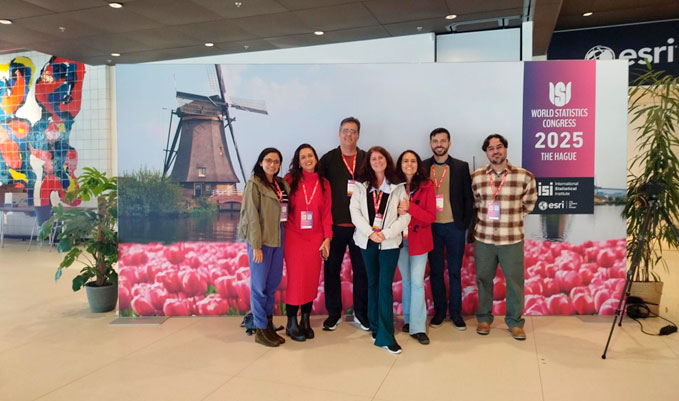
As the major international event in the area, the 65th World Statistics Congress brought together, between October 5 and October 9, more than 2,000 delegates from governments, universities and private companies in its 65th edition, in The Hague, in the Netherlands. Organized biennially since 1887 by the International Statistical Institute (ISI), the meeting promoted the exchange of experiences and innovations in the production and dissemination of statistics.
The event had significant participation from representatives of National Statistical Offices and institutions relevant to the production of official and experimental statistics. IBGE was present with a delegation made up of seven officers: Alinne Veiga, Maria Luiza Toledo, Claudio Marques and Bianca Walsh, from the National School of Statistical Sciences; Ian Nunes and Marcelo Maia, from the Directorate of Surveys; and Andrea Diniz da Silva, from the Presidency.
The officers participated in invited sessions and tables, in which they presented and debated important innovations in the work processes of the IBGE activity program. The participation provided a valuable opportunity to exchange knowledge and experiences with peers from the national and international statistical community.
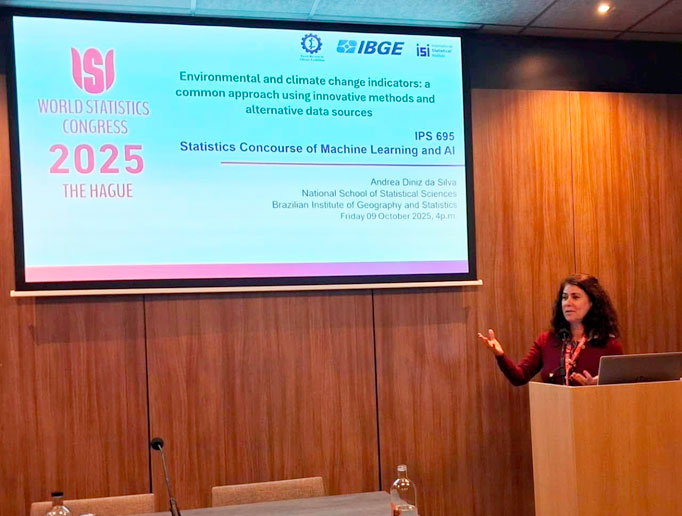
Andrea Diniz da Silva, the IBGE´s Head of International Relations and professor at the National School of Statistical Sciences, presented the project “Environmental and climate change indicators: a common approach using innovative methods and alternative data sources”, coordinated by the IBGE and developed in partnership with 11 countries in Latin America and the Caribbean.
The Congress addressed central themes for the statistical production agenda, with emphasis on dozens of sessions focused on modernization, new methods, evaluation and dissemination of data in population censuses, household surveys and business surveys. The officer highlighted that strategic issues for methodological development, coordination and integration of statistical systems were discussed, in addition to aspects related to technical cooperation and institutional organization.
“This is a valuable combination of cutting-edge content, a huge network of opportunities, high-value learning, knowledge sharing, award celebrations and creation of new collaboration opportunities,” said Andrea Diniz da Silva.
The event had a strong presence of international statisticians, technicians and scholars, business leaders and thinkers in the field, who debated current and future themes in more than 200 sessions. The program included topics directly aligned with the IBGE's modernization agenda, such as innovative methods, machine learning, artificial intelligence, the future of sample surveys in the era of big data, use of massive data to monitor the 2030 Agenda, emerging technologies and challenges of statistical systems.
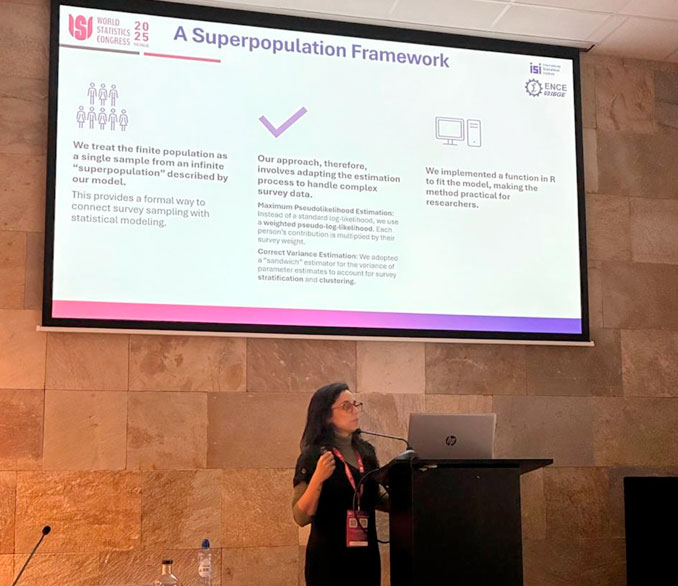
Participation in the World Statistics Congress 2025 reinforces the IBGE's presence on the international scene
Participating in the congress was a remarkable experience for researcher Alinne Veiga. During the congress, the officer met researchers and teachers with whom she had contact during her PhD in England, including her assisting tutor, which made the experience even more meaningful. The sessions attended addressed topics directly related to the current challenges faced by the IBGE, such as official statistics, use of administrative records, survey statistics and the integration of artificial intelligence in the modernization of statistical production.
“Two reflections by researcher Natalie Shlomo summarized the spirit of the discussions. The first — “Surveys aren’t going anywhere” — highlighted that, even with the advancement of new data sources, sample surveys will continue to be fundamental to validating and complementing administrative records. The second — “All statisticians are data scientists, but the opposite isn’t true” — reinforced the depth and rigor of statistical science,” highlighted Alinne Veiga.
Another point highlighted by the officer was the importance of integrating into the international community. “I realized how much difference it makes to be part of this global environment. I left there with the desire to join the IASS (International Association of Survey Statisticians), as the topics discussed in these forums are extremely relevant,” stated her.
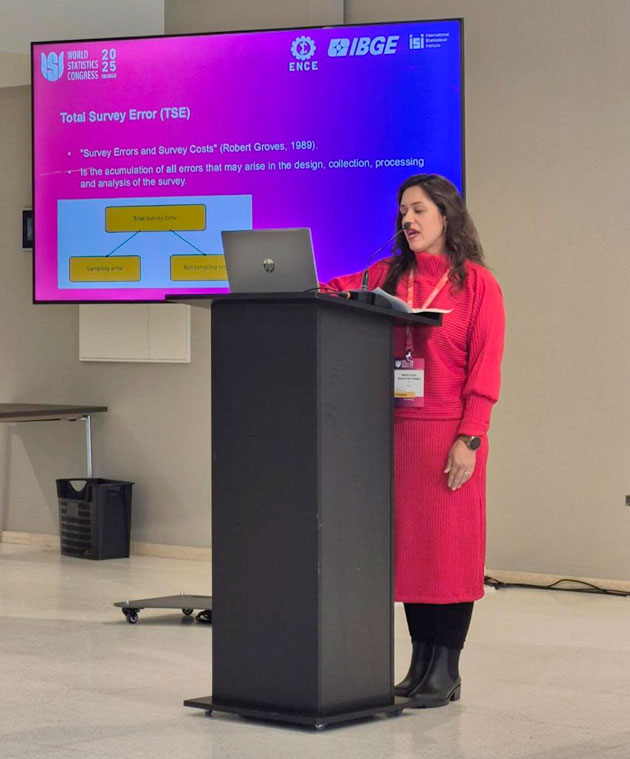
ENCE researcher and teacher, Maria Luíza Toledo, presented a study developed in partnership with officers Cristiano Fonseca and Lucas Silveira, from the IBGE Superintendence in Minas Gerais (SES-MG), on the estimation of non-sampling error in the Continuous PNAD.
The work supported the implementation of a Quality Supervision project in the survey, with re-interviews and the use of consistency indicators to monitor possible interferences by the interviewer in the results. The presentation was part of a thematic session dedicated to non-response bias and the presence of missing values in statistical surveys.
“The presentation was part of a session dedicated to non-response bias and missing values in surveys and included active participation from the public, which raised questions about field procedures and the possibility of using artificial intelligence systems as interviewers," explained Toledo.
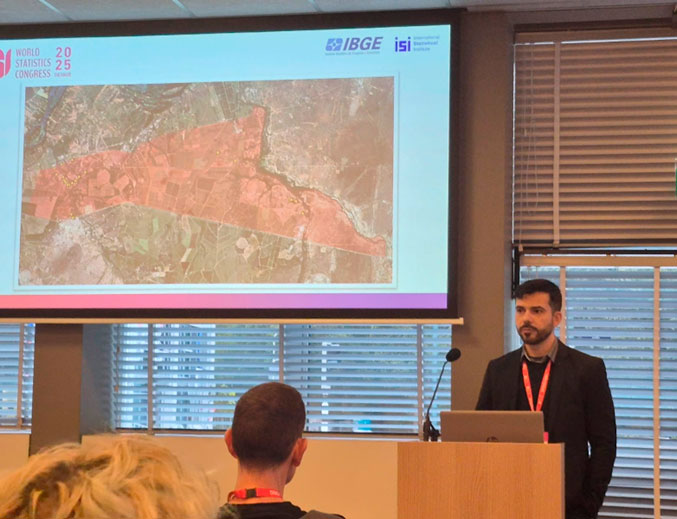
Officer Marcelo Rodrigues de Holanda Maia, from the recently created Department of Agricultural Data Intelligence and Innovation (GIDAI), linked to DPE/COAGRO, presented the work “Developing Improvements in Field Operations with Routing Optimization for the Brazilian Census of Agriculture.”
The survey details innovative proposals to optimize the field operations of the Census of Agriculture, with emphasis on the mapping of roads in rural enumeration areas and the application of optimization algorithms in planning enumerators' routes. The solutions aim to reduce operational costs and increase the logistical efficiency of data collection in large and difficult-to-access areas.
During the congress, Marcelo Maia also attended sessions focused on the convergence between official statistics and data science, reinforcing a strategic vision for the future of statistical production in Brazil. “The adoption of advanced optimization and artificial intelligence techniques is a promising path to improving the accuracy, efficiency and relevance of official statistics. Participating in this global event reinforces the IBGE's commitment to incorporating cutting-edge methodologies into large-scale national surveys,” stated him.

Officer Ian Nunes, manager of the Department of Agricultural Data Intelligence and Innovation (GIDAI/COAGRO/DPE), presented the work “Divide and conquer: Using plots to understand agricultural activities”, which details the methodology of plotment of the national territory — a technique that divides rural space into continuous and homogeneous areas, called plots, for the purposes of agricultural analysis.
The proposal allows for a more precise reading of activities in the field, by identifying areas with agricultural use and enabling their spatialization based on territorial continuity and uniformity. During the presentation, Nunes discussed the statistical applications of plotment, its impacts on data production and the prospects for future use of the technique to generate more refined and territory-sensitive statistics.
Furthermore, the officer participated in debates on the use of artificial intelligence, machine learning and optimization methods in statistical production, especially in the context of national statistical offices. “Observing virtually all NSOs incorporating computational mathematics techniques, machine learning, artificial intelligence, among others, made me believe that the path we are following at COAGRO is not only aligned, but is at the forefront of modernizing the production of official agricultural statistics,” stated him.
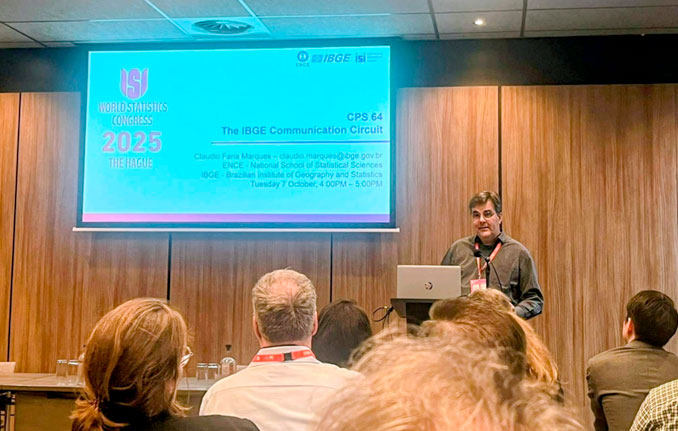
Journalist and ENCE teacher, Claudio Marques, presented the article “The IBGE Communication Circuit” during the CPS 64 session – Data Dissemination and User Engagement in Official Statistics, at the congress. The work, based on one of the topics of his PhD thesis, proposes a communication circuit model to analyze how the IBGE disseminates its statistical information to society.
The proposal seeks to understand and improve institutional communication flows, focusing on the accessibility and effectiveness of the transmission of data produced by the IBGE. “It is necessary to make information increasingly accessible to society as a whole. Strengthening the dissemination flow is crucial to combat misinformation and promote citizenship,” highlighted Claudio Marques.
The presentation was part of a broader debate on the role of statistical institutions in the information age, with an emphasis on transparency, user engagement and the social responsibility of public data communication.
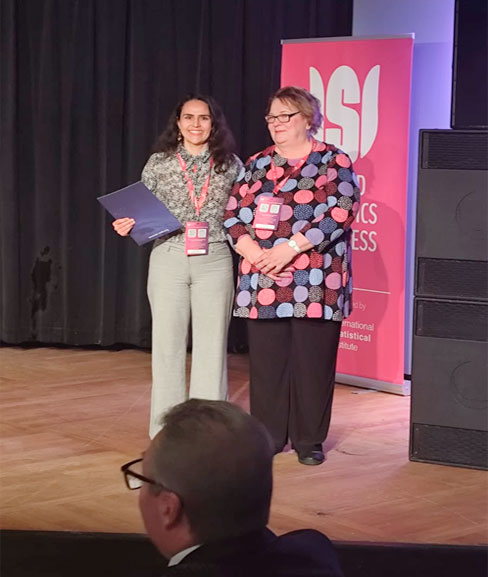
IBGE is recognized for statistical literacy actions
Officer Bianca Walsh represented the IBGE with three oral presentations, including one at the satellite event of the International Association of Statistical Education (IASE-ISI). The works presented detailed statistical literacy projects developed at ENCE in partnership with teachers Larissa Alves and Renata Bueno.
In addition to the presentations, Walsh took to the stage to receive, on behalf of two Brazilian students, the prize for the international round of the Statistical Poster Competition. She coordinated the competition in Brazil alongside teacher Mauren Porciúncula, from FURG, acting as national coordinators within the scope of the International Statistical Literacy Project (ISLP-IASE).
“Participating in ISI was the confirmation that we are on the right path in promoting statistical literacy. We have received recognition from international references in the area. Furthermore, I was fortunate to represent Brazil in the ISLP competition — a huge achievement for Brazil and for the IBGE, which embraced the initiative in the 2024 and 2025 editions,” highlighted Bianca Walsh.




















